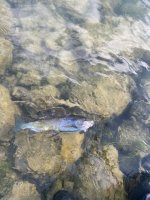Silent Ocelot
Well-known member
Some people were brought here against there own will? Does that make them invasive? I am just curious. The more I ponder this the less I am inclined to hold brown trout as a species as accountable for being inherently destructive for the environment as they were brought her by MAN and didn't have a say in where they were going. I do agree with brown trout being a problem for indigenous native brook trout and the actions (if any) to stop this problem, but it is funny to think that brown trout were sent here against their own accord and are blamed as a problem for simply existing, a problem that wouldn't have occurred if man had not transported them.
The underlying root of any environmental problem is always man, though man cannot admit they are the problem and a hindrance for the any eco system, that would require introspection.
The underlying root of any environmental problem is always man, though man cannot admit they are the problem and a hindrance for the any eco system, that would require introspection.





